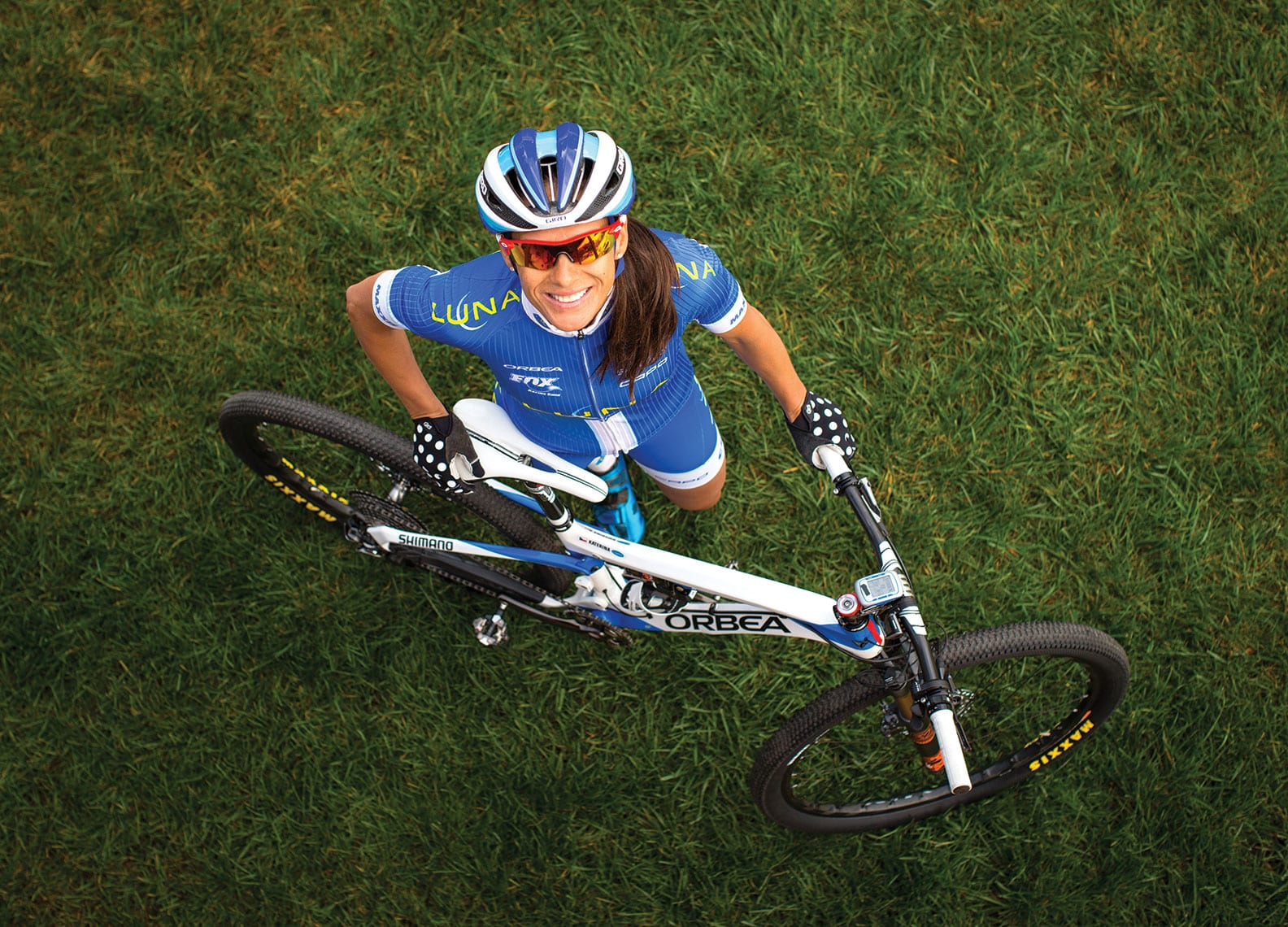
22 Jun Revolutionary Athlete
Truckee Olympian Katerina Nash has achieved much success since her youth in communist Czechoslovakia
To be clear, Katerina Nash is not defending communism. As a child of Soviet-run Czechoslovakia and the late 1980s Velvet Revolution, she is quick to say that democracy and America are good, that Czechoslovakia—now the Czech Republic—was in desperate need of the revolution that would reshape its society.
No, the five-time Olympian and 17-year Truckee resident is definitely not defending communism.
That said, coming of age as a young athlete in a nation that provided free skis, free community centers, free summer camps and free ski academies wasn’t the worst thing in the world, either. To a girl who just wanted to play outside, communism was all right.
Sure, she didn’t own her first pair of jeans until she was a teenager. Sure, her father, a semipro soccer player, would smuggle in basic goods when returning from international matches. And yes, she couldn’t cross borders or have nice things or learn to speak English.
But hey: free skis. To young Nash, who admittedly avoided reading and anything else that hinted of indoor domesticity, the outdoors was life itself, and skiing the pinnacle of existence.
It’s part of the reason why, at 39 years old, she’s still a dominant presence in outdoor athletic events in the Truckee area and abroad.
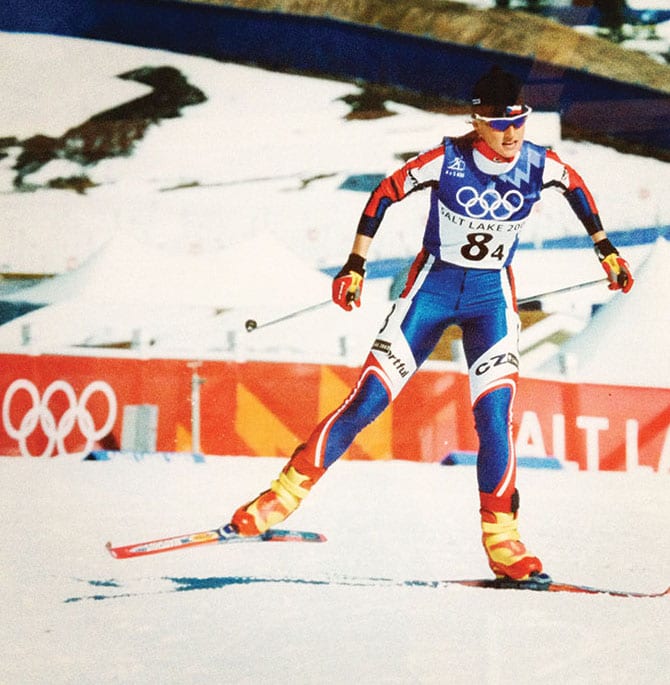
Katerina Nash skis at the 2002 Salt Lake City Olympics, submitted photo
Communist-era Upbringing
Born and raised in the small town of Prachatice in southwest Czechoslovakia, Nash—then Katerina Hanusova—learned to Nordic ski at the age of 5 in the modest foothills along the closed borders of Austria and West Germany.
Alone or with a band of unregulated children, she would climb the hills at random, a semi-feral child at one with the forested slopes sequestered from the democratic evils of the world beyond Czech borders. Her parents were both present—very much so, thanks to the communist-regulated glass factory that employed nearly every adult in Prachatice—but 1980s Czechoslovakia was a different world from the one experience by the average American. In her home country, children went off to summer camps—free, of course—actively participated in the local community center—again, free—and rode bikes across town in roving packs of migratory prepubescents.
It was in that environment that Nash learned to ski. From the foothills surrounding her childhood home, she graduated to the inner track at the community soccer stadium, transitioning soon after to the outer track, where hormonal teenagers sped around the younger kids, simultaneously perfecting both their trash-talking and Nordic technique. Around that time, still in elementary school, the young skier won her first junior national championship and the attention of several regional coaches, one of whom became an early hero to Nash, both for his personality and his unorthodox approach to training.
“He definitely took us places we weren’t supposed to be,” Nash says. “I swear it was on purpose. He made it a game. We would be skiing and he would tell us, ‘If you hear a motorcycle or a car, you need to disappear.’”
She laughs about it now, but at the time, even as a 10-year-old girl, getting caught in West Germany would have ended her ski career in a hail of bullets.
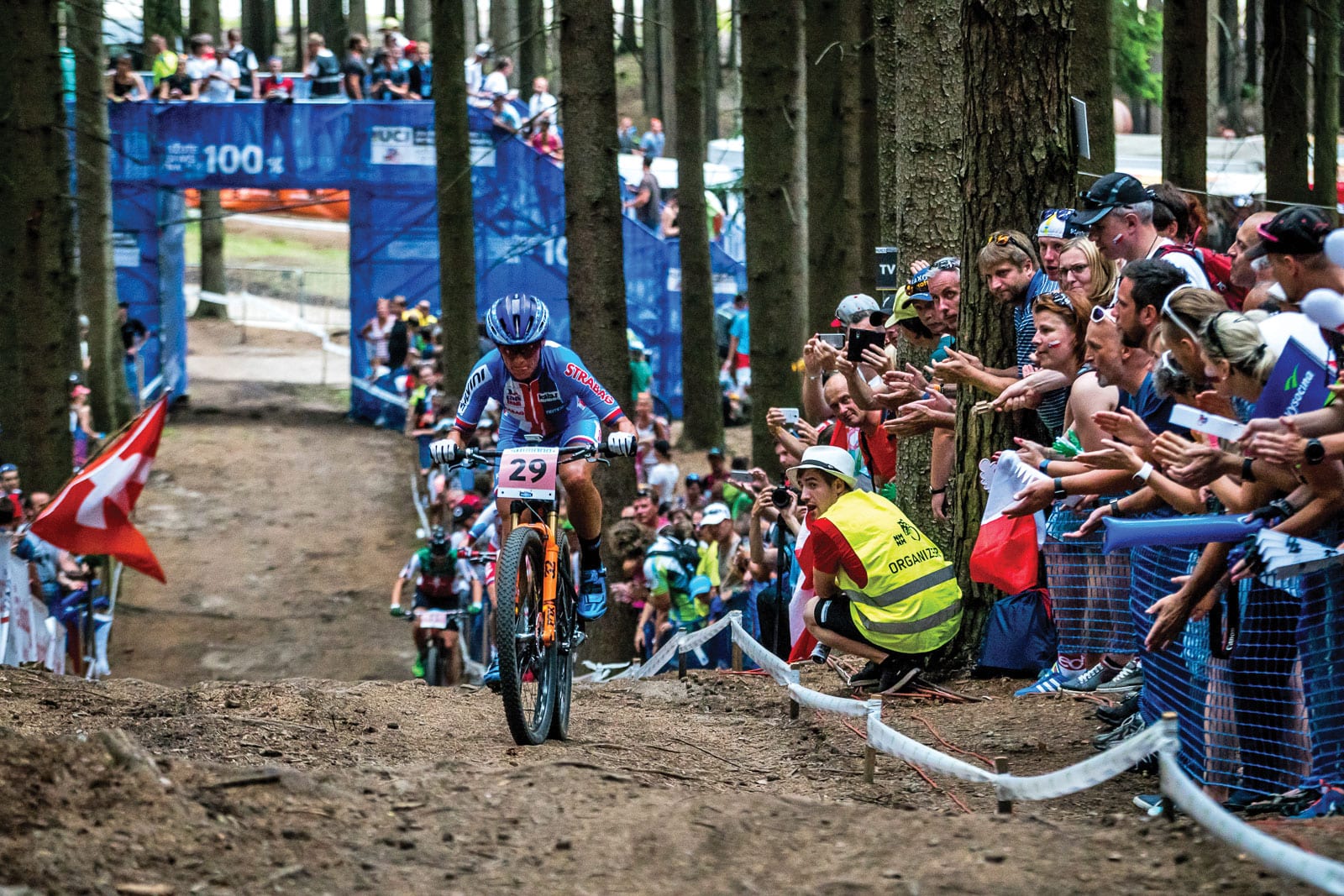 Nash races to fifth place at the 2016 World Mountain Bike Championships in Nové Mesto, Czech Republic, photo courtesy Clif (LUNA) Pro Team
Nash races to fifth place at the 2016 World Mountain Bike Championships in Nové Mesto, Czech Republic, photo courtesy Clif (LUNA) Pro Team
Newfound Opportunities
When the communist structure toppled four years later, everything changed.
“The revolution happened during Christmas break,” Nash recalls. “We went home for the holidays and when we returned to school, we were suddenly learning German and English. The teachers were only a few lessons ahead of the rest of the class.”
In the space of a few weeks, the old order was dissolved in the Velvet Revolution, a peaceful transfer of power from communism to democracy, also known as the Gentle Revolution.
Gone were the mandatory pro-Russia lesson plans in which students were made to learn the names of rivers and mountain ranges they would likely never see. Gone were the propaganda campaigns praising communism and disparaging America. Gone was the need to steal across borders as a refugee, and the government-sanctioned oppression of the families who stayed behind.
In many ways, Nash’s early athletic career was smooth sailing compared to that of her forebears, who couldn’t travel internationally without a government chaperone to ensure that nobody defected. For Nash, the timing of her country’s revolution could not have been better. As a young athlete in a young nation, opportunities abounded and were ripe for the plucking.
For example, the first Olympics in which the teenage skier competed was the 1996 Summer Games in Atlanta—not as a skier, but as a mountain biker, a sport she didn’t know existed a few years prior.
“We were the first generation of skiers who were also mountain bikers,” Nash says. “I was pretty good at it pretty quickly, but I don’t want to make it sound like I got on a bike for the first time and just started winning.”
The truth is, when she got on a bike for the first time, she just started winning.
To understand how a young skiing talent became a young mountain biking prodigy, one must first understand the national gymnasium system of education that shaped Nash.
In old Eastern Europe tradition, a gymnasium is like a trade school, a preparatory school and a boarding academy all rolled into one, yet it is somehow more than the sum of its parts. Unlike American institutions that are as much holding tanks as they are institutions of learning, the gymnasium is a microcosm of society, shaped according to the personal and professional needs of the young adults. Or, as Nash puts it, “It was like online school without the online part.”
For Nash, the gymnasium was a pipeline for promising athletes; a government-sponsored facility for those who would one day bring great honor to their country.
“I knew if I was going to be more serious about skiing, I would need to relocate,” she says. “The gymnasium in my hometown was good, but there were no ski opportunities there.”
So, the teenager moved northwest to attend the gymnasium in the small town of Vimperk nestled within the Šumava mountain range—also known as the Bohemian Forest—where in the winter she trained and skied rigorously six days a week and in the spring was made to buckle down and complete all the schoolwork she had missed while skiing.
“You had to have your [act] together,” Nash says about the education. “You weren’t going to be just an athlete.”
That’s not to say that Nash and the five other elite athletes in her class, representing the best of the new generation of skiers, were not also expected to win competitions. Indeed, the teenagers trained and traveled with a feverish intensity often frowned upon in gentler societies. Though demanding, Nash responded to the pressure and continued to excel.
“The decision to go to the ski academy was the point when I realized, ‘I’m going to do everything I can to be an athlete,’” she says. “Of course, it was very structured… too structured for some of the students. It was maybe a little intense at that early age, but that’s also what led me to the Olympics and beyond.
“If I were to do it all over again, I might not have been so hard on myself, and I would maybe back off on the pressure a little bit. But at the same time, when you get into something, you want to do it right. I wanted to do skiing right.”
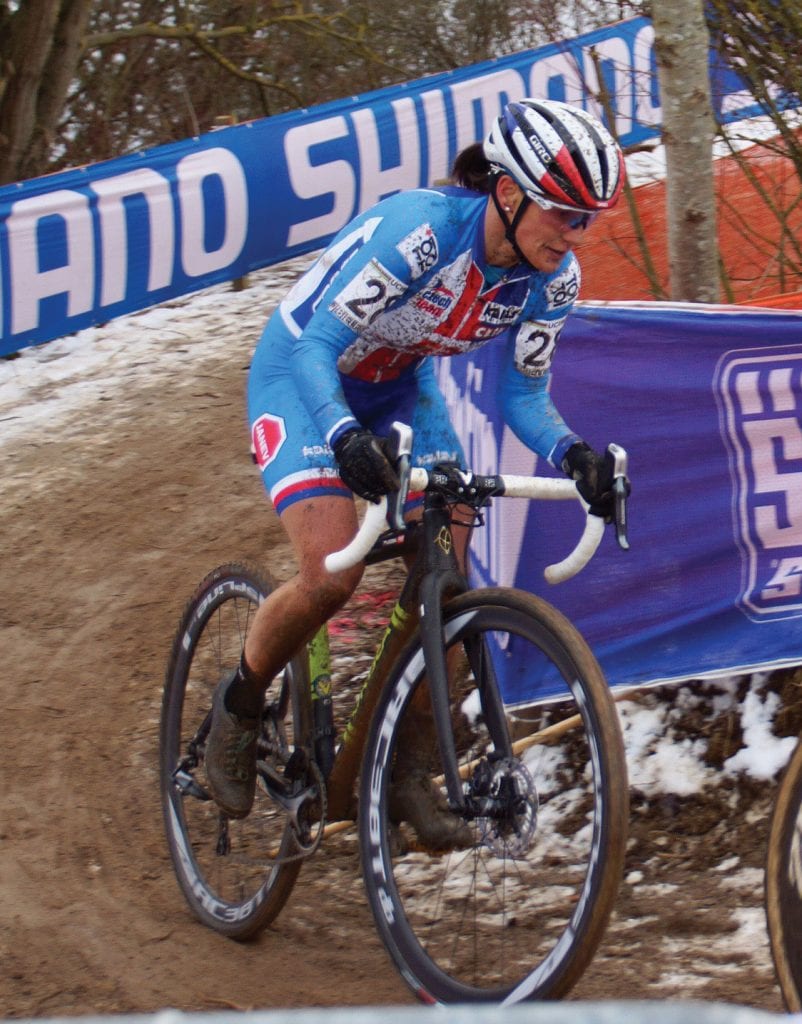
Nash races to third place at the 2017 World Cyclo-Cross Championships, photo courtesy Clif (LUNA) Pro Team
Immediately Elite
And then, she found herself in the saddle of a mountain bike.
“Halfway through the ski academy, when I was 16, a guy came in with four or five used mountain bikes and offered to take people out who wanted to ride,” Nash says. “We quickly formed a little team with those bikes and we took it seriously.”
So seriously, in fact, that the team chose to enter its first competition within days of getting the bikes—and to enter in the elite category.
“That’s the Eastern European way,” Nash says with a laugh. “Throw yourself into something and see what happens.”
What happened was this: Nash took her place at the top of a mountain in early spring, atop a used bike—foreign, unfamiliar, though somehow perfectly natural. At the sound of the gun, she began the breakneck descent of the nasty singletrack, a steep pencil-scratch of a trail with roots and rocks jutting out of the hard dirt. Two hours later she crossed the finish line, claiming first place and a new hobby that would eventually redefine her athletic career.
But at that time, still a teen, Nash was a skier above all else. And it was to skiing that she dedicated her entire adolescence: all four years of academy—the nearly impossible training schedule combined with the frenzy of academic catch-up during the spring—then the year spent living in and training from a lonely bed-and-breakfast deep in the Šumava mountains, and finally the invitation to accept a ski scholarship, first to University of Colorado in Boulder in 1999, and then to University of Nevada, Reno, in 2000, which she commuted to from Truckee. Skiing was her livelihood, and her dedication to the sport took her to two Olympic Games—Nagano, Japan, in 1998 and Salt Lake City in 2002.
And still, looming in the back of her mind, there was mountain biking. After all, it had been the reason for her first Olympic Games, where, she is quick to point out, she didn’t place last.
“I was only in my third year of mountain biking when I went to Atlanta,” she says. “I was the youngest on the team and I had very little experience. I had only happened to qualify at the important events, which is why I made it to Atlanta in the first place.”
After Atlanta, an experience as overwhelming to the 19-year-old as it was invigorating, five years passed before she climbed back into the saddle competitively. But after those five years, having competed in two Winter Olympics and graduating from University of Nevada, Reno, with a business and marketing degree, Nash had to make a decision.
“I knew that if I wanted to keep skiing at the highest level, I would have to go back to Europe and join a national team,” she says. “But I didn’t want to go back. I wanted to stay in Truckee. Because cyclists don’t have to join a national team, I decided to look for a cycling team to join.”
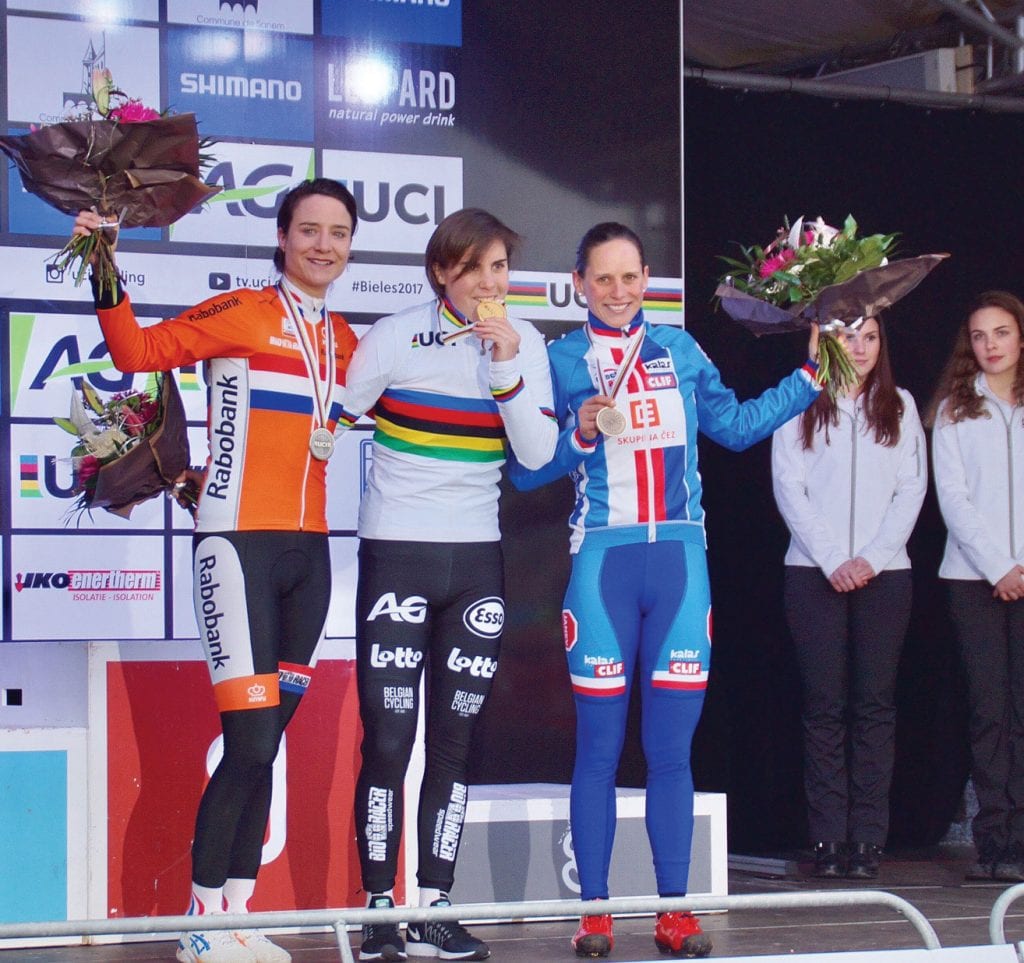 Nash on the podium with her bronze medal at the 2017 World Cyclo-Cross Championships, photo courtesy Clif (LUNA) Pro Team
Nash on the podium with her bronze medal at the 2017 World Cyclo-Cross Championships, photo courtesy Clif (LUNA) Pro Team
Dave McLaughlin of the Clif Pro Team—formerly LUNA—remembers the first time he saw Nash race. Sixteen years ago, the man who is currently general manager of the longest-standing mountain bike team was at the World Championship race in Vail, Colorado, looking to fill out his roster. Nash was there, too, competing for the Czech Republic national team and wondering how much longer she could wing it as a professional athlete before having to get a real job.
Neither McLaughlin nor Nash recall how well she raced that day, or exactly how they met, but what remains unassailable is that they did meet, and McLaughlin complimented her on her success both as a skier and mountain biker and invited her to join his team.
“Katerina got on my radar early—I had been aware of her as a skier—and when I saw her race in Vail I took note,” McLaughlin says. “I figured if we gave her time to develop, she was going to become a champion. Sixteen years later she’s the only original member still racing, and she’s still winning.”
Despite the fact that she’s nearly 40, she continues to rake in the wins, including her most recent victory at the Cyclocross World Cup in Belgium last year, one of six World Cups she’s won.
“She’s hugely talented and she has a great cardio capability,” says Margie Lapoint of Truckee, Nash’s friend and frequent riding partner. “But I really think her success is the result of her positive mindset. She stays relaxed and never gets worked up. For Katerina, it’s all about what’s going on upstairs. She’s almost 40, but she’s right in there with the 20-year-olds.
“In fact,” Lapoint adds, “she just keeps getting better and better. From the age of 35 to 39, she’s had some of her greatest success.”
Continued Success
One of Nash’s biggest athletic accomplishments occurred last summer at the Olympic Games in Rio de Janeiro, where she claimed fifth place in the mountain biking event, a marked improvement from the disappointment of the 2012 Summer Olympics in London and her no-show at the 2008 Olympics in Beijing.
“I missed Beijing because I ripped my knee just before,” Nash says. “I was the best rider on the team before and after recovery, but the timing was off. It was a huge disappointment, and I carried that disappointment into London four years later. I put so much into that race and I did not perform well.
“After London, I was done chasing the dream,” she adds. “I came out of it telling everyone, ‘I’m through with the Olympics.’”
She continued to race, however, and continued to win. In 2013, she won the UCI Cross Country World Cup in Canada. In 2014, she won the Cross Country Pro Cup in the United States, the UCI Cyclocross World Cup in Belgium and the National Cyclocross Championship in the Czech Republic. In 2015, she won the UCI World Cup CrossVegas race in Nevada, with the Rio games just around the corner.
“After my World Cup win, everyone was saying I was going to the Olympics,” Nash says. “I kept telling them, ‘No, I’m done with the Olympics.’”
When the Czech national team coach selected her, though, she agreed to represent her country one last time.
“I was very prepared for Rio,” she says. “I went in mentally fresh without any of the internal pressure of London, and I came out so happy with my race. I would have loved a medal, but I crossed the line very happy with my fifth place and proud of what I had accomplished.
“I walked away from Rio with the closure I needed.”
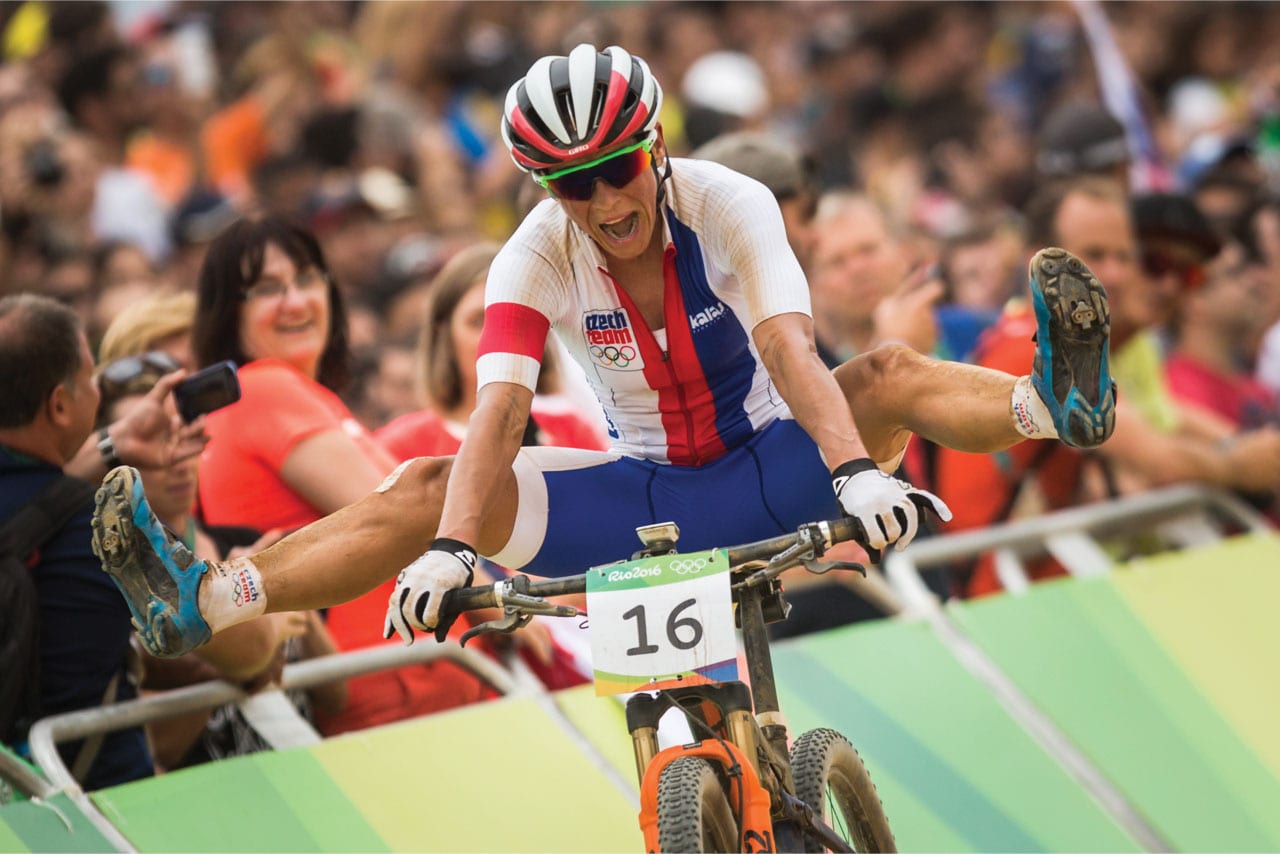 Nash celebrates her fifth-place finish at the 2016 Rio Olympics, photo by Michael Cerveny
Nash celebrates her fifth-place finish at the 2016 Rio Olympics, photo by Michael Cerveny
With the Olympics behind her, and no plans to compete in 2020 (though she said the same after London), Nash is content just to train in the Truckee area with her friends and teammates.
“Whenever she’s not on a specific training regimen, we’ll do a nice ride together or walk the dogs,” says Lapoint. “We just did a 30-mile ride for my birthday. Katerina is obviously very fast, but she is so accommodating to people’s needs. She encourages everyone.”
When she is on a specific training regimen, Nash likes to start her day early with a morning hike with her dogs, Rubicon and Lola, followed by a long ride on either her road or mountain bike, depending on the season.
“I’ll ride between two and five hours a day,” she says. “My favorite is the Tahoe Rim Trail, but I ride a lot around Truckee, both on road and trails. I also spend a lot of time riding around Reno and the foothills of Auburn. I still love it.”
And therein lies the secret to her continued success: Nash actually likes to ride her bike. It’s fun, she says, and if it happens to be her livelihood, hey, all the better.
“You can tell the ones who don’t love this,” says Nash, who recently competed on her road bike in the Amgen Tour of California. “They quit the sport early because they see it as a job. Sure, there are those days of hard intensity while riding in the rain, with results that aren’t great, but ultimately I still love to ride my bike.”
Though her teammates are convinced she’ll never retire, Nash knows, theoretically, she cannot be a professional athlete forever. Nevertheless, she feels strong, healthy and fast as ever.
“For five years I’ve reassessed at the end of each summer if I want to keep going,” says Nash, who also still competes for fun in local Nordic events, winning the Great Ski Race from Tahoe City to Truckee on three occasions. “And so far the answer is, ‘Yes, I want to keep going.’”
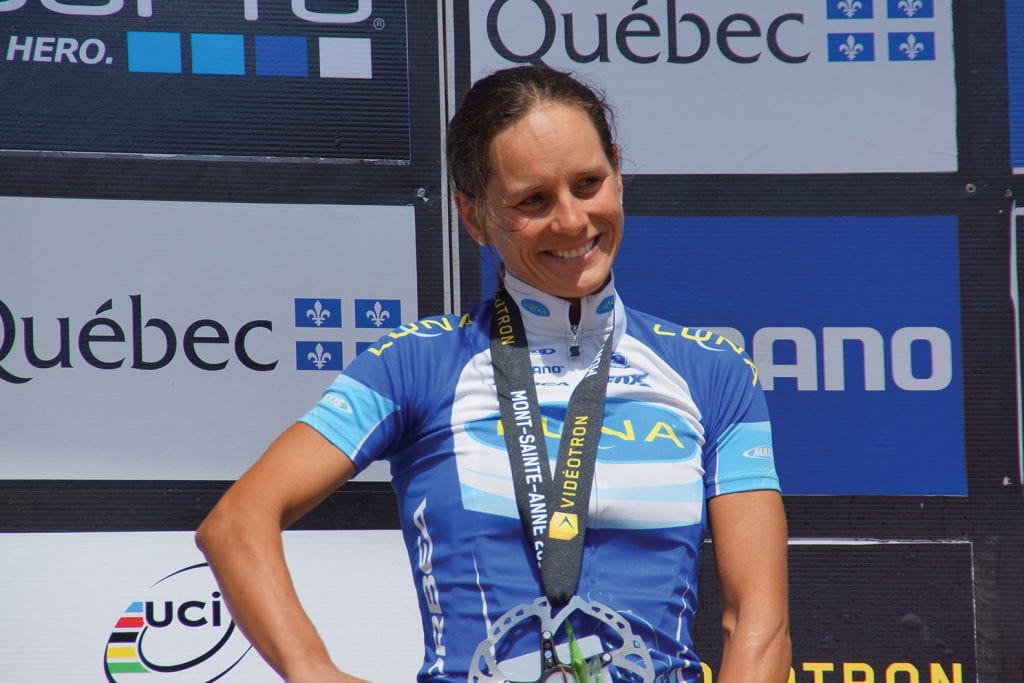 Nash on the podium after her Mt. St. Anne, Quebec, World Cup win in 2013, photo courtesy Clif (LUNA) Pro Team
Nash on the podium after her Mt. St. Anne, Quebec, World Cup win in 2013, photo courtesy Clif (LUNA) Pro Team
In many ways, Nash as an adult is no different from the semi-feral prepubescent roaming the foothills of Czechoslovakia 30 years ago.
“We were just out there with our bamboo poles and hand-me-downs,” she says. “We never needed much. We were just happy to be outside and active.”
Though the time and location has changed, that same mindset pervades her professional career today.
“I get to travel the world and race in amazing places,” she says. “This is the coolest job I could ever do, and if I could go back and do it all again, I wouldn’t change a thing.”
Michael Rohm is a freelance writer from Portland, Oregon, who currently lives in the foothills near Colfax, California. He enjoys reading, writing and hiking with whatever dog will have him.



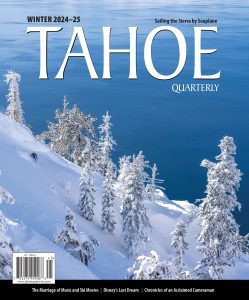
No Comments